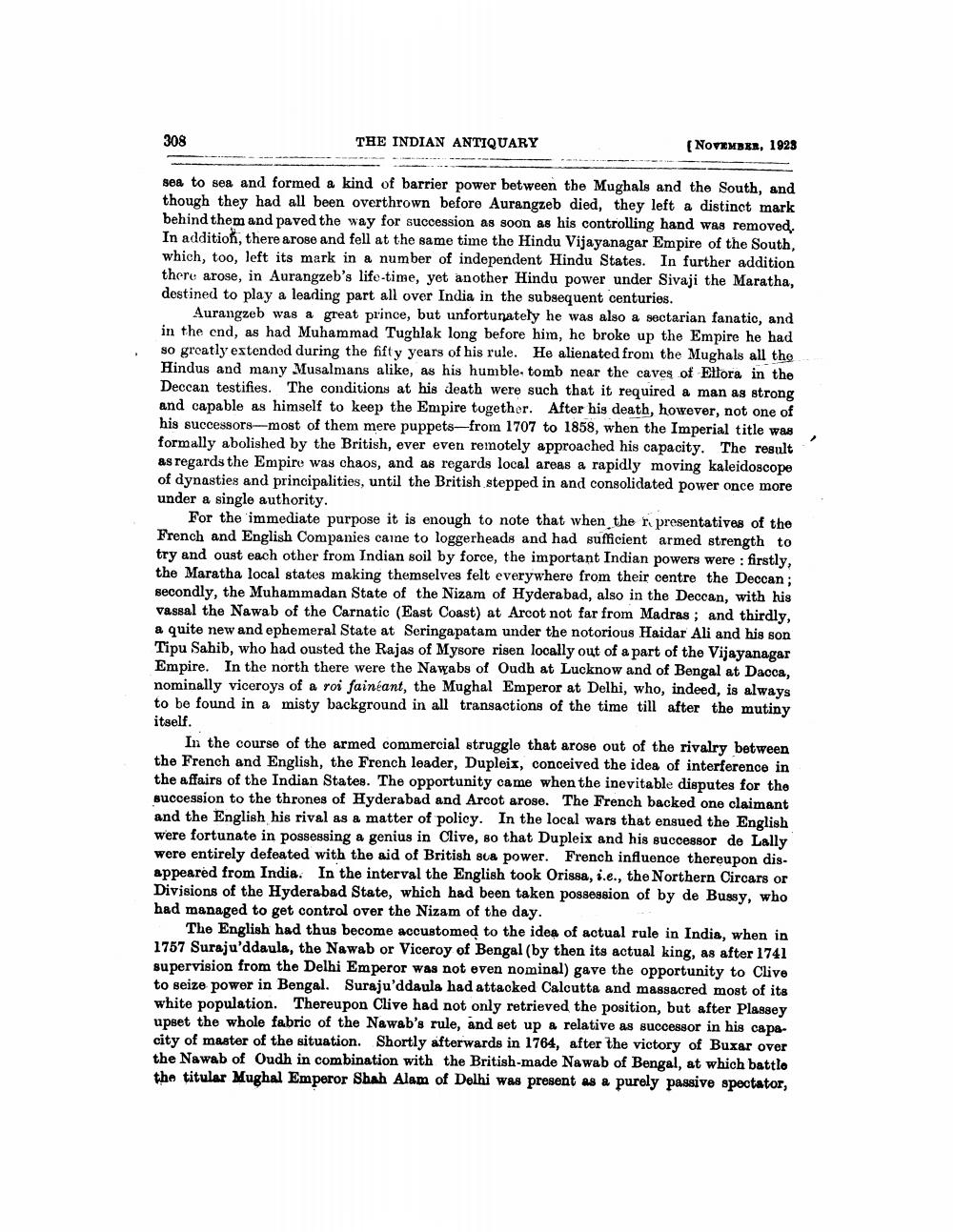________________
308
THE INDIAN ANTIQUARY
( NOVEMBER, 1923
sea to sea and formed a kind of barrier power between the Mughals and the South, and though they had all been overthrown before Aurangzeb died, they left a distinct mark behind them and paved the way for succession as soon as his controlling hand was removed, In addition, there arose and fell at the same time the Hindu Vijayanagar Empire of the South, which, too, left its mark in a number of independent Hindu States. In further addition there arose, in Aurangzeb's life-time, yet another Hindu power under Sivaji the Maratha, destined to play a leading part all over India in the subsequent centuries.
Aurangzeb was a great prince, but unfortunately he was also a sectarian fanatic, and in the end, as had Muhammad Tughlak long before him, he broke up the Empire he had so greatly extended during the fifty years of his rule. He alienated from the Mughals all the Hindus and many Musalmans alike, as his humble. tomb near the caves of Ellora in the Deccan testifies. The conditions at his death were such that it required a man as strong and capable as himself to keep the Empire together. After his death, however, not one of his successors-most of them mere puppets-from 1707 to 1858, when the Imperial title was formally abolished by the British, ever even remotely approached his capacity. The result as regards the Empire was chaos, and as regards local areas a rapidly moving kaleidoscope of dynasties and principalities, until the British stepped in and consolidated power once more under a single authority.
For the immediate purpose it is enough to note that when the presentatives of the French and English Companies caine to loggerheads and had sufficient armed strength to try and oust each other from Indian soil by force, the important Indian powers were : firstly, the Maratha local states making themselves felt everywhere from their centre the Deccan; secondly, the Muhammadan State of the Nizam of Hyderabad, also in the Deccan, with his vassal the Nawab of the Carnatic (East Coast) at Arcot not far from Madras; and thirdly, a quite new and ephemeral State at Seringa patam under the notorious Haidar Ali and his son Tipu Sahib, who had ousted the Rajas of Mysore risen locally out of a part of the Vijayanagar Empire. In the north there were the Nawabs of Oudh at Lucknow and of Bengal at Dacca, nominally viceroys of a roi fainéant, the Mughal Emperor at Delhi, who, indeed, is always to be found in a misty background in all transactions of the time till after the mutiny itself.
In the course of the armed commercial struggle that arose out of the rivalry between the French and English, the French leader, Dupleix, conceived the idea of interference in the affairs of the Indian States. The opportunity came when the inevitable disputes for the succession to the thrones of Hyderabad and Arcot arose. The French backed one claimant and the English his rival as a matter of policy. In the local wars that ensued the English were fortunate in possessing a genius in Clive, so that Dupleix and his successor de Lally were entirely defeated with the aid of British sca power. French influence thereupon disappeared from India. In the interval the English took Orissa, i.e., the Northern Circars or Divisions of the Hyderabad State, which had been taken possession of by de Bussy, who had managed to get control over the Nizam of the day.
The English had thus become accustomed to the idea of actual rule in India, when in 1757 Suraju'ddaula, the Nawab or Viceroy of Bengal (by then its actual king, as after 1741 supervision from the Delhi Emperor was not even nominal) gave the opportunity to Clive to seize power in Bengal. Suraju'ddaula had attacked Calcutta and massacred most of its white population. Thereupon Clive had not only retrieved the position, but after Plassey upset the whole fabric of the Nawab's rule, and set up a relative as successor in his capacity of master of the situation. Shortly afterwards in 1764, after the victory of Buxar over the Nawab of Oudh in combination with the British-made Nawab of Bengal, at which battle the titular Mughal Emperor Shah Alam of Delhi was present as a purely passive spectator,




